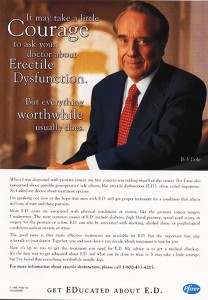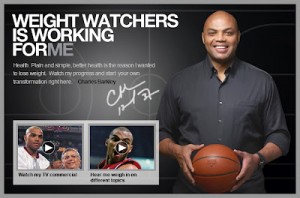 As women are generally thought of by marketers as the Chief Health Officers of their families, images of men in health advertising and media have been fewer than their female counterparts. In 1998, Pfizer promoted Viagra through Bob Dole. In 2003, Magic Johnson represented GSK’s HIV treatment Combivir. That same year, Mike Ditka, football coach, hawked Levitra, the ED drug, for GSK. Dr. Robert Jarvik has repped Lipitor (controversially), and Bobby Labonte, a NASCAR driver, endorsed Wellbutrin XL.
As women are generally thought of by marketers as the Chief Health Officers of their families, images of men in health advertising and media have been fewer than their female counterparts. In 1998, Pfizer promoted Viagra through Bob Dole. In 2003, Magic Johnson represented GSK’s HIV treatment Combivir. That same year, Mike Ditka, football coach, hawked Levitra, the ED drug, for GSK. Dr. Robert Jarvik has repped Lipitor (controversially), and Bobby Labonte, a NASCAR driver, endorsed Wellbutrin XL.
But since the advent of direct-to-consumer health advertising, there haven’t been as many celebrity men promoting health as there have been women.
Now, it’s the Equal Opportunity Era of the Man in health care ads. I was struck this week with the announcement from Merck that Mike Golic, of ESPN’s Mike & Mike morning sports news program (a staple in my husband’s morning TV consumption watched alternatively with MSNBC’s Morning Joe) will work with the drug company to promote awareness of Type 2 Diabetes through the company’s Blood Sugar Basics Game Plan. The URL for the project is BloodSugarBasics.com. Golic has been working with Merck on the program since 2011, but this week is the launch of the expanded website.
At the start of 2012, I was also intrigued to see that Weight Watchers launched an aggressive campaign with Charles Barkley, basketball star, saying, “The best part of Weight Watchers? Eating the food I like.” As part of its “Lose Like a Man” campaign, WW offers an online “Grill Cheat Sheet” and a “Beer Cheat Sheet.” Other weight management companies, such as Nutrisystem and Jenny Craig, also use weight-losing celebrity spokesMen like Dan Marino, Don Shula and Jason Alexander of Seinfeld fame. AdWeek covered the story last year, with the title, Men Try Not to Laugh About Joining Weight Watchers.
Health Populi’s Hot Points: While we could argue the merits or deficits caused by DTC advertising, the observation that there are more men starring in health ads is important because, in the U.S., we’re in the thick of the consumer-driven health care era. As more health citizens cover more costs out-of-pocket, and must make more choices concerning clinical treatments and health plan selections, it’s crucial for people to engage in health. Health engagement leads to better health outcomes for people, who undertake more self-care, seek information through trusted sources, and mine expertise from their doctors, pharmacists, other clinical experts, as well as patients like them.
From prescription drugs to weight loss, illness to wellness, this phenomenon has been occurring in media, online, via broadcast, and in print. That men are being recognized as patients and health consumers, too, in the last couple years of health marketing, is an important cultural and clinical artifact.





 I am so grateful to Tom Lawry for asking me to pen the foreword for his book, Health Care Nation,
I am so grateful to Tom Lawry for asking me to pen the foreword for his book, Health Care Nation,  Thanks to Feedspot for naming this blog, Health Populi, as a
Thanks to Feedspot for naming this blog, Health Populi, as a